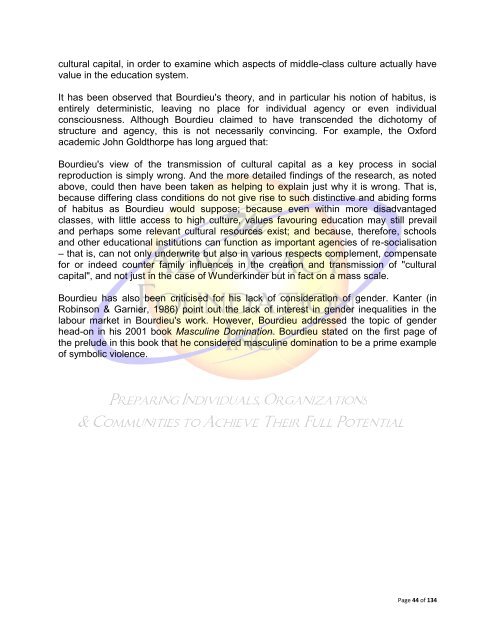Cultural Transformation
Cultural Transformation
Cultural Transformation
Create successful ePaper yourself
Turn your PDF publications into a flip-book with our unique Google optimized e-Paper software.
cultural capital, in order to examine which aspects of middle-class culture actually have<br />
value in the education system.<br />
It has been observed that Bourdieu's theory, and in particular his notion of habitus, is<br />
entirely deterministic, leaving no place for individual agency or even individual<br />
consciousness. Although Bourdieu claimed to have transcended the dichotomy of<br />
structure and agency, this is not necessarily convincing. For example, the Oxford<br />
academic John Goldthorpe has long argued that:<br />
Bourdieu's view of the transmission of cultural capital as a key process in social<br />
reproduction is simply wrong. And the more detailed findings of the research, as noted<br />
above, could then have been taken as helping to explain just why it is wrong. That is,<br />
because differing class conditions do not give rise to such distinctive and abiding forms<br />
of habitus as Bourdieu would suppose; because even within more disadvantaged<br />
classes, with little access to high culture, values favouring education may still prevail<br />
and perhaps some relevant cultural resources exist; and because, therefore, schools<br />
and other educational institutions can function as important agencies of re-socialisation<br />
– that is, can not only underwrite but also in various respects complement, compensate<br />
for or indeed counter family influences in the creation and transmission of "cultural<br />
capital", and not just in the case of Wunderkinder but in fact on a mass scale.<br />
Bourdieu has also been criticised for his lack of consideration of gender. Kanter (in<br />
Robinson & Garnier, 1986) point out the lack of interest in gender inequalities in the<br />
labour market in Bourdieu's work. However, Bourdieu addressed the topic of gender<br />
head-on in his 2001 book Masculine Domination. Bourdieu stated on the first page of<br />
the prelude in this book that he considered masculine domination to be a prime example<br />
of symbolic violence.<br />
Page 44 of 134

















